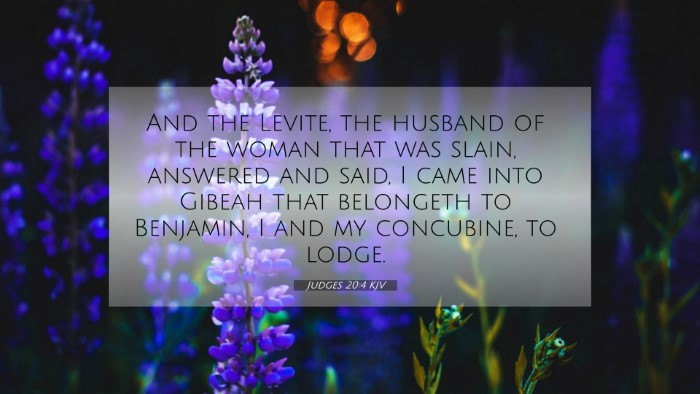Understanding Judges 20:4
Judges 20:4 states: "And the Levite, the husband of the woman that was slain, answered and said, I came unto Gibeah that belongeth to Benjamin, I and my concubine, to lodge." This verse opens a significant narrative in the Book of Judges, where the personal tragedy of the Levite's concubine serves as a catalyst for national turmoil in Israel.
Contextual Background
The Book of Judges captures a period in Israel's history characterized by cycles of sin, oppression, repentance, and deliverance. The events surrounding Judges 20 are particularly chaotic, illustrating the moral decline of the Israelites. The Levite's experience is central to the story as it highlights the consequences of moral failure within society.
Verse Analysis
This verse lays the groundwork for later discussions regarding the sinfulness of the people and the consequences that ensue. It presents various themes including:
- The Tragedy of Sin: The Levite's journey to Gibeah ends in violence and injustice, showcasing how sin affects individuals and communities.
- Social Injustice: The Levite's concubine is victimized, and the response of the tribe of Benjamin to protect their people illustrates a perversion of justice.
- Need for Accountability: This narrative sets the stage for the call for accountability and justice among the tribes of Israel.
Thematic Connections
Judges 20:4 connects with several important themes throughout the Bible:
- Justice: Isaiah 1:17 advises, "Learn to do good; seek justice, correct oppression." The cry for justice resonates throughout scripture.
- Victimization: The plight of the concubine reflects wider biblical themes of social justice and the treatment of the vulnerable, similar to Genesis 34:2.
- Moral Decline: The moral failures mirrored here can be compared to Romans 1:21-32, where Paul describes the degeneration of society's values.
Cross-References
To deepen your understanding of Judges 20:4, consider the following cross-references:
- Genesis 19:4-5 – The parallels in the treatment of guests and the violation of hospitality.
- Deuteronomy 22:25-27 – Laws concerning the punishment of sexual assault and protection of women.
- 1 Samuel 11:4-5 – Another example of tribal conflict within Israel.
- Matthew 18:15-17 – The principles of conflict resolution that echo the need for community accountability.
- Hebrews 10:30 – The divine justice that God promises against unrighteousness.
- Isaiah 5:20 – A warning against calling evil good and good evil, relevant to the injustice depicted in Judges.
- Proverbs 28:4 – The relationship between justice and those who forsake the law.
Inter-Biblical Dialogue
Judges 20:4 engages in inter-Biblical dialogue with the larger narrative of the Bible regarding communal ethics, justice, and social responsibility. By examining these connections, readers can grasp how the moral lessons from Judges continue to resonate today.
Conclusion
Judges 20:4 serves as a poignant reminder of the destructive nature of sin and the vital importance of justice and accountability in society. By cross-referencing with related scriptures, one can find deeper insights into the narratives of the Bible that speak to the condition of the human heart and the need for divine intervention.
Further Study
For those interested in exploring Bible verse cross-references further, consider utilizing a Bible cross-reference guide or a Bible concordance. These tools can help identify connections between Bible verses and enhance your understanding through comprehensive Bible cross-reference materials.
In summary, Judges 20:4 is not just a standalone verse; it opens up a wealth of exploration for understanding God's justice, the nature of sin, and the societal implications of moral failures as seen throughout the Scriptures.



